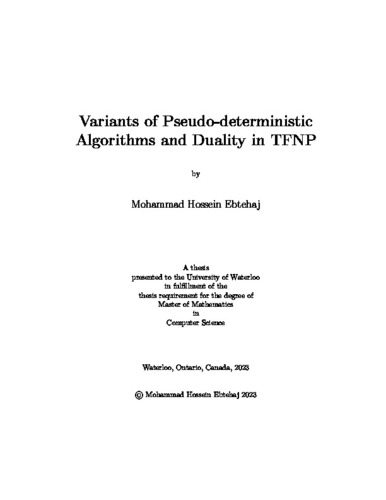| dc.contributor.author | Ebtehaj, Mohammad Hossein | |
| dc.date.accessioned | 2023-08-18 19:40:27 (GMT) | |
| dc.date.available | 2023-08-18 19:40:27 (GMT) | |
| dc.date.issued | 2023-08-18 | |
| dc.date.submitted | 2023-08-12 | |
| dc.identifier.uri | http://hdl.handle.net/10012/19721 | |
| dc.description.abstract | We introduce a new notion of ``faux-deterministic'' algorithms for search problems in query complexity. Roughly, for a search problem $\cS$, a faux-deterministic algorithm is a probability distribution $\mathcal{A}$ over deterministic algorithms $A\in \mathcal{A}$ such that no computationally bounded adversary making black-box queries to a sampled algorithm $A\sim \mathcal{A}$ can find an input $x$ on which $A$ fails to solve $\cS$ ($(x, A(x))\notin \cS$). Faux-deterministic algorithms are a relaxation of \emph{pseudo-deterministic} algorithms, which are randomized algorithms with the guarantee that for any given input $x$, the algorithm outputs a unique output $y_x$ with high probability. Pseudo-deterministic algorithms are statistically indistinguishable from deterministic algorithms, while faux-deterministic algorithms relax this statistical indistinguishability to computational indistinguishability.
We prove that in the query model, every verifiable search problem that has a randomized algorithm also has a faux-deterministic algorithm. By considering the pseudo-deterministic lower bound of Goldwasser et al. \cite{goldwasser_et_al:LIPIcs.CCC.2021.36}, we immediately prove an exponential gap between pseudo-deterministic and faux-deterministic complexities in query complexity. We additionally show that our faux-deterministic algorithm is also secure against quantum adversaries that can make black-box queries in superposition.
We highlight two reasons to study faux-deterministic algorithms. First, for practical purposes, one can use a faux-deterministic algorithm instead of pseudo-deterministic algorithms in most cases where the latter is required. Second, since efficient faux-deterministic algorithms exist even when pseudo-deterministic ones do not, their existence demonstrates a barrier to proving pseudo-deterministic lower bounds: Lower bounds on pseudo-determinism must distinguish pseudo-determinism from faux-determinism.
Finally, changing our perspective to the adversaries' viewpoint, we introduce a notion of ``dual problem'' $\cS^{*}$ for search problems $\cS$. In the dual problem $\cS^*$, the input is an algorithm $A$ purporting to solve $\cS$, and our goal is to find an adverse input $x$ on which $A$ fails to solve $\cS$. We discuss several properties in the query and Turing machine model that show the new problem $\cS^*$ is analogous to a dual for $\cS$. | en |
| dc.language.iso | en | en |
| dc.publisher | University of Waterloo | en |
| dc.subject | pseudo-deterministic algorithms | en |
| dc.subject | complexity theory | en |
| dc.subject | query complexity | en |
| dc.subject | meta-complexity | en |
| dc.subject | quantum query complexity | en |
| dc.title | Variants of Pseudo-deterministic Algorithms and Duality in TFNP | en |
| dc.type | Master Thesis | en |
| dc.pending | false | |
| uws-etd.degree.department | David R. Cheriton School of Computer Science | en |
| uws-etd.degree.discipline | Computer Science | en |
| uws-etd.degree.grantor | University of Waterloo | en |
| uws-etd.degree | Master of Mathematics | en |
| uws-etd.embargo.terms | 0 | en |
| uws.contributor.advisor | Ben-David, Shalev | |
| uws.contributor.affiliation1 | Faculty of Mathematics | en |
| uws.published.city | Waterloo | en |
| uws.published.country | Canada | en |
| uws.published.province | Ontario | en |
| uws.typeOfResource | Text | en |
| uws.peerReviewStatus | Unreviewed | en |
| uws.scholarLevel | Graduate | en |

